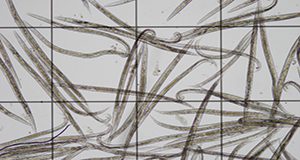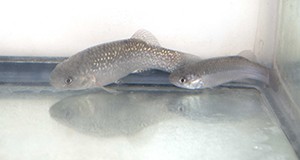
A small nematode worm commonly referred to as a “microworm” has been a staple live feed used in the ornamental aquaculture industry for over 50 years. These worms are small enough to be ingested by the larvae of many commonly cultured ornamental species, and their production methods are simple and reliable. Microworms have the potential to provide appropriate nutrition in a live feed organism that is cultured entirely in-house and involves less labor and cost than newly hatched Artemia. In this 4-page fact sheet published by the UF/IFAS School of Forest Resources and Conservation, Program in Fisheries and Aquatic Sciences, authors Shane W. Ramee, Taylor N. Lipscomb, and Matthew A. DiMaggio discuss the biology, environmental requirements, and culture techniques for microworms and explain their importance for the larval culture of freshwater fish species.
http://edis.ifas.ufl.edu/fa214
Tag: Shane W. Ramee
Candidate Species for Florida Aquaculture: Gulf Killifish, Fundulus grandis

The Gulf killifish is a promising species for commercial aquaculture in Florida with the potential to help diversify the marine baitfish aquaculture industry in Florida and throughout the southeastern United States. Methods for culturing this species have improved in the past decade; this 6-page fact sheet describes the new methods and some strategies to give producers greater control of reproduction, larval growth, and survival. The publication provides the information producers need to make the most informed decision possible when considering Gulf killifish aquaculture. Written by Shane W. Ramee, Joshua T. Patterson, Cortney L. Ohs, and Matthew A. DiMaggio and published by the Program in Fisheries and Aquatic Sciences, School of Forest Resources and Conservation.
http://edis.ifas.ufl.edu/fa190